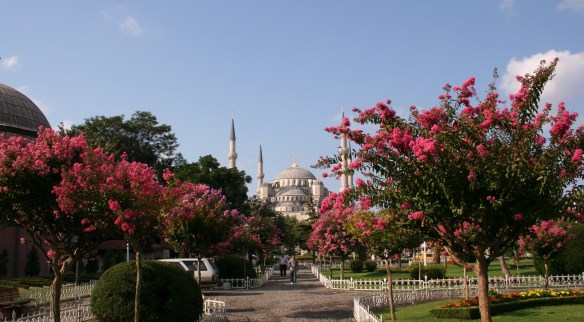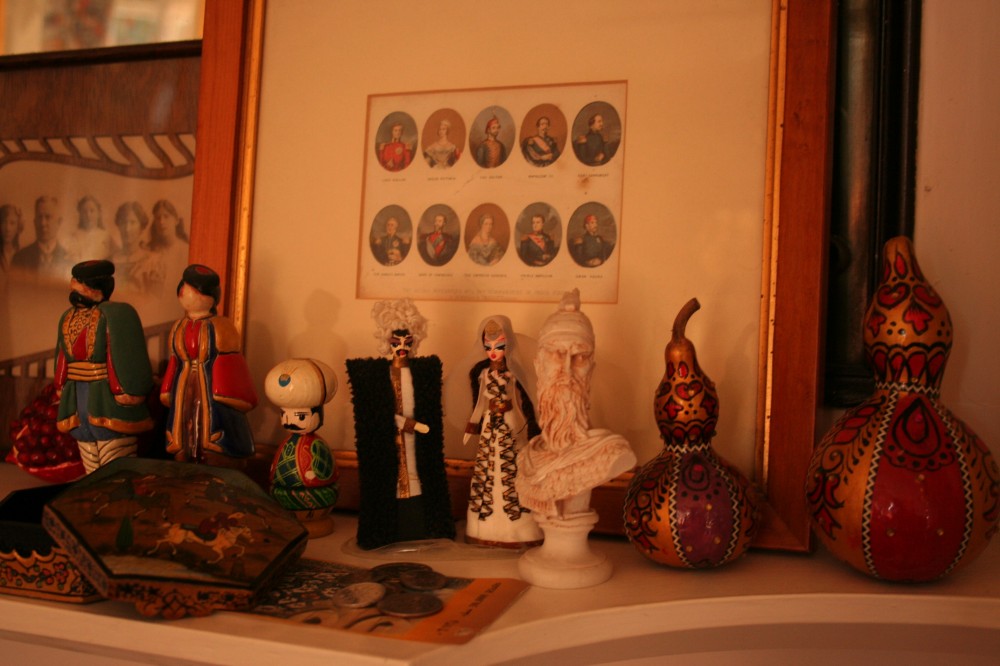IS IT PART OF A prime minister’s role to pass judgement on the nation’s prime-time TV broadcasts? It may remain open to question, but as noted in an earlier post, Turkish premier Recep Tayyip Erdoğan has expressed his disapproval of the hugely popular soap opera Muhteşem Yüzyıl. The Turkish viewing public doesn’t appear to be taking his tut-tutting to heart if the 1.2 million ‘likes’ on Facebook for the series are any indication (as noted on the official website). Muhteşem Yüzyıl and other historical TV series have been credited with inspiring interest in other Turkish artforms, particularly novels, both within Turkey and beyond.
In fact, the popularity of the TV series is increasing beyond Turkey’s borders. Sociologist Nilüfer Narlı, from Bahçeşehir University, notes that soap operas are raising Turkey’s profile in the international arena, particularly in the Arab world and the Balkans, a projection of soft power in the cultural sphere in formerly Ottoman domains. This is happening not only at an diplomatic level, as government officials from Turkey and its neighbours interact, but also at an individual level as the television-watching public ponders the narratives, events and themes of historical Turkish soap operas and of the history (or histories) that lie behind them.
 At the vanguard is Muhteşem Yüzyıl, appropriately enough as the series focuses on the life of Süleyman, perhaps the most celebrated of all Ottoman sultans, and commander of the Ottoman campaign against Vienna in the 1520s. Formerly known only as a ruler and military figure, Süleyman, through this portrayal, is now seen as an individual, a lover, a human figure, which is prompting – presumably only in some quarters – a reappraisal of the Ottoman era in the Balkans.
At the vanguard is Muhteşem Yüzyıl, appropriately enough as the series focuses on the life of Süleyman, perhaps the most celebrated of all Ottoman sultans, and commander of the Ottoman campaign against Vienna in the 1520s. Formerly known only as a ruler and military figure, Süleyman, through this portrayal, is now seen as an individual, a lover, a human figure, which is prompting – presumably only in some quarters – a reappraisal of the Ottoman era in the Balkans.
As reported in the SE Times, revisiting history can provoke different reactions. Birgül Demirtaş, an Ankara-based Balkan expert, argues that in the wake of Muhteşem Yüzyıl the Ottoman centuries, previously regarded in the Balkans as a “black page”, are now being re-evaluated through a prism of “common history”. On the other hand, Milica Mijovic, from the Serbian publishing house Narodna Knjiga, while conceding that “everyone across the region watches it”, remarks that period dramas such as Muhteşem Yüzyıl have made the “Balkans almost nostalgic for a not-so-fabulous past”. It’s not unequivocal enthusiasm, is it?
The Bosnians, perhaps most likely to be fans on the basis of their shared Islamic faith, are lapping it up. A competition, which attracted hundreds of applicants, was run on the Bosnian channel Televizja OBN to find people who most resemble Sultan Süleyman and his bride Hürrem and who would ring in the New Year in Sarajevo. Well, presumably the competition was to find people who look like Halit Ergenç and Meryem Uzerli, the actors who portray the great sultan and his one true love respectively, rather than the actual real-life historical figures. (For mine, Meryem Uzerli has something of Kate Hudson about her, but I’m not sure if the real Hürrem did…)
 One can only wonder if the Turkish premier approves of a sultan-look alike performing a midnight countdown, but his earlier condemnation of the series resonated in some quarters. Turkish Airline THY promptly dropped Muhteşem Yüzyıl from its inflight entertainment services after Erdoğan’s criticism. However, one carrier’s loss is another’s opportunity, it would seem, because Emirates promptly snapped up the series for its own inflight channels. This is the first Turkish TV series to have featured on any of the Arab airlines, a situation which will probably win the drama an even wider viewing audience.
One can only wonder if the Turkish premier approves of a sultan-look alike performing a midnight countdown, but his earlier condemnation of the series resonated in some quarters. Turkish Airline THY promptly dropped Muhteşem Yüzyıl from its inflight entertainment services after Erdoğan’s criticism. However, one carrier’s loss is another’s opportunity, it would seem, because Emirates promptly snapped up the series for its own inflight channels. This is the first Turkish TV series to have featured on any of the Arab airlines, a situation which will probably win the drama an even wider viewing audience.
Meanwhile, Erdoğan’s outburst, which was duly echoed by various of his AKP parliamentarians, has been greeted with dismay from many observers. The Erdoğan government had earlier been praised by demonstrating itself willing to confront aspects of Turkey’s history which had been taboo and to make some efforts to address, or at least discuss, past wrongs. There are various skeletons in closets that the AKP were willing to examine, but which had long been denied or glossed over by the Kemalist apparatus, or on which debate had been stymied by staunch Kemalists. The AKP’s approach was initially welcomed as part of a grand reckoning that could see Turkey casting off historical millstones and forging on in a new era of openness and accountability. However, as columnist Semih İdiz has written, it would appear that AKP is no more an impartial in its approach to history than the Kemalists were. Agendas are still imposed, and histories must be viewed through particular prisms, just different ones to those in play before.
Perhaps it’s just history repeating itself – a historical re-enactment, if you will – this time with different actors and different spectators choosing alternative rose-coloured glasses to embellish the view.
